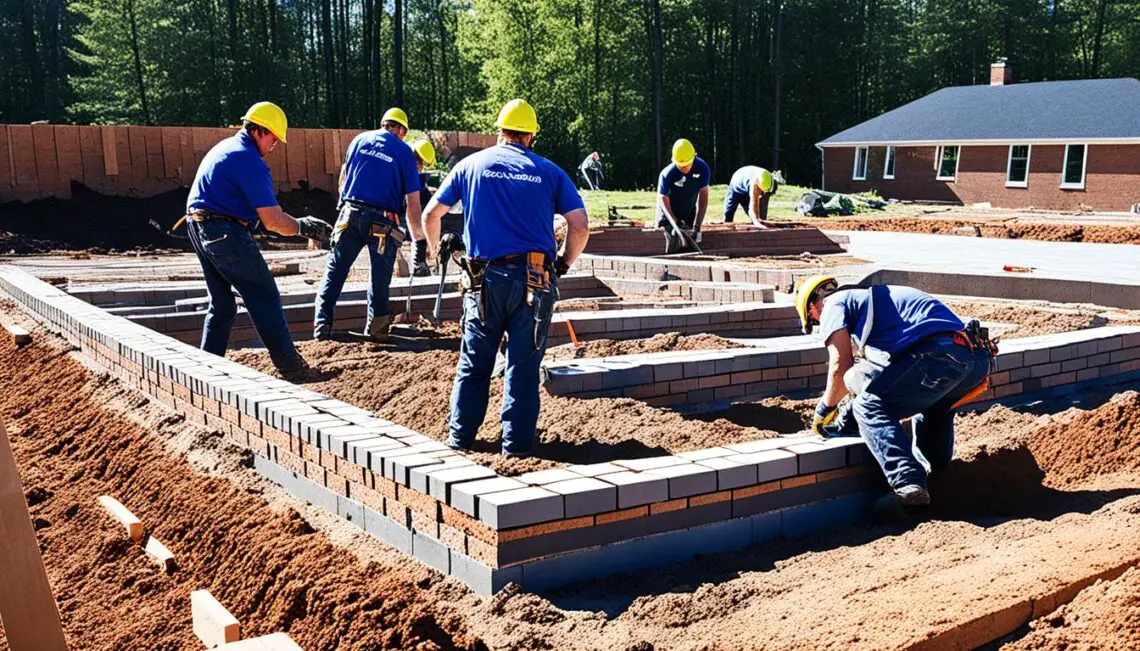Welcome to our comprehensive guide on preparing for your life together! As you embark on this beautiful journey of building a strong foundation and creating a life filled with love and happiness, it’s essential to be equipped with the necessary knowledge and skills to ensure a successful partnership.
Whether you’re in a committed relationship, engaged, or considering marriage, this article will provide you with valuable tips and advice on life readiness, relationship readiness, and the steps you can take to prepare for a fulfilling married life. From effective communication and conflict resolution to nurturing emotional intimacy and balancing individuality, each section is designed to empower you with the tools you need to thrive as a couple.
Together, let’s explore the key aspects of preparing for marriage and discover practical strategies that will strengthen your bond and set you up for a lifetime of happiness.
Key Takeaways:
- Assess your life readiness before entering a committed partnership.
- Establish open and honest communication as the foundation of your relationship.
- Enhance your communication skills through active listening and constructive feedback.
- Develop effective strategies for resolving conflicts peacefully.
- Nurture emotional intimacy through vulnerability and empathy.
Assessing Your Life Readiness
Before embarking on the journey of marriage, it is essential to assess your individual life readiness. Taking the time to evaluate your emotional, financial, and personal readiness for the commitments that marriage entails can lay a strong foundation for a successful partnership.
Preparing for marriage goes beyond the excitement of wedding planning and dreaming about your future together. It involves introspection and thoughtful consideration of various aspects of your life.
Emotional readiness is about understanding your own emotions and being able to communicate effectively with your partner. It involves self-awareness, empathy, and a willingness to work through challenges together.
Financial readiness is crucial for the stability and security of your marriage. It involves assessing your financial situation, budgeting, and planning for shared financial goals and responsibilities.
Personal readiness encompasses aspects of your individual life that can impact your relationship. This includes considering your personal values, beliefs, and goals, as well as your ability to prioritize your partner’s needs alongside your own.
Assessing your life readiness allows you to identify areas of strength and areas that may need further development. It provides an opportunity for open and honest conversations with your partner, ensuring that you are both aligned in your expectations and prepared for the journey ahead.
By engaging in pre-marital preparation and seeking guidance from couples counseling or a marriage preparation program, you can further enhance your life readiness and strengthen the foundation of your relationship.
In the next section, we will delve into the importance of building a strong foundation for your relationship and the key elements that contribute to its success.
Establishing Strong Relationship Foundations
Building a strong foundation is vital for a successful and fulfilling marriage. It sets the stage for a lasting partnership filled with love, trust, and understanding. In this section, we will explore essential elements that contribute to establishing a solid groundwork for your relationship.
The Power of Communication
Open and honest communication is the cornerstone of any strong relationship. It forms the basis for understanding, empathy, and effective problem-solving. By fostering healthy communication habits, you create an environment where both partners feel heard, respected, and valued.
Take the time to listen actively to your partner, seeking to understand their thoughts, feelings, and concerns. Express yourself honestly and authentically, using “I” statements to avoid blame or defensiveness. By maintaining open lines of dialogue, you can work together to overcome challenges and strengthen your bond.
Nurturing Trust
Trust is the foundation on which every successful relationship is built. It is the belief that you can rely on your partner, knowing that they have your best interests at heart. Building trust involves consistency, reliability, and honesty.
Cultivate trust by honoring commitments, being true to your word, and demonstrating consistency in your actions. Be transparent and open with your partner, sharing your thoughts, feelings, and fears. Trust grows over time as you witness each other’s actions aligning with your shared values and commitments.
Developing Shared Values
Shared values provide a strong framework for your relationship, guiding your decision-making and shaping your future together. Take the time to explore and discuss your core beliefs, goals, and aspirations.
Identify the values that are most important to both of you and find ways to integrate them into your daily lives. This shared sense of purpose will serve as a compass, guiding your actions and strengthening your connection.

By investing in effective communication, nurturing trust, and developing shared values, you are laying the groundwork for a resilient and fulfilling relationship. In the next section, we will explore practical strategies to enhance your communication skills, enabling you to navigate challenges and deepen your connection.
Enhancing Communication Skills
Effective communication is the cornerstone of a thriving relationship. It allows for understanding, connection, and the resolution of conflicts. By honing your communication skills, you can create a solid foundation for a healthy and fulfilling partnership.
One essential aspect of communication is active listening. It involves fully focusing on your partner and seeking to understand their perspective without interruption. When you actively listen, you show respect and build trust, paving the way for open and honest dialogue.
Constructive feedback is another vital tool in improving communication. When providing feedback, do so in a considerate and non-threatening manner. By expressing your thoughts and emotions effectively, you foster understanding and mutual growth within the relationship.
Conflict resolution is an inevitable part of any relationship, but it doesn’t have to be destructive. Embrace peaceful resolution techniques such as finding common ground, compromising, and empathizing with your partner’s emotions. This approach allows for conflict to be transformed into opportunities for growth and strengthened connection.
Remember, enhancing communication skills requires practice and patience. Be mindful of your words, tone, and body language. Strive to cultivate an environment where both partners feel comfortable expressing their thoughts and feelings openly.
By investing time and effort into improving your communication skills, you will foster greater understanding, intimacy, and emotional support within your relationship.
Developing Conflict Resolution Strategies
Conflicts are an inevitable part of any relationship, but they don’t have to be detrimental. In fact, how you navigate and resolve conflicts can ultimately strengthen the bond between you and your partner. In this section, we will explore effective conflict resolution strategies that will help you build a healthier and more harmonious relationship.
One vital aspect of conflict resolution is the willingness to compromise. It’s important to understand that it’s not about winning or losing, but finding a solution that works for both parties. By approaching conflicts with empathy and a genuine desire to understand your partner’s perspective, you can foster understanding, respect, and cooperation.
Seeking professional support, such as couples counseling, can also be immensely helpful in navigating complex conflicts. A relationship education program or therapy can provide you with tools, guidance, and a safe space to communicate your needs, emotions, and concerns. The guidance and expertise of a professional can help you develop healthier communication patterns and equip you with the skills needed to resolve conflicts effectively.
Remember, conflict resolution is not about avoiding disagreements altogether, but rather finding constructive and respectful ways to address them. Through open communication, compromise, and the willingness to seek help when needed, you can cultivate a relationship that thrives even in the face of challenges.
Nurturing Emotional Intimacy
Emotional intimacy forms the foundation of a deep and fulfilling connection. It is the ability to truly understand and be understood by your partner. When you foster emotional intimacy, you create a safe and nurturing space where trust, vulnerability, and empathy can thrive. This section will guide you on the journey of nurturing emotional intimacy, allowing you and your partner to experience a profound sense of closeness and connection.
To cultivate emotional intimacy, it is crucial to create an environment where both partners feel safe to express their emotions without judgment. Encourage open and honest communication, where you actively listen to each other’s thoughts and feelings. Practice empathy by putting yourself in your partner’s shoes, seeking to understand their perspective, and responding with compassion.
Vulnerability is also an essential component of emotional intimacy. It involves sharing your innermost thoughts, fears, and dreams with your partner, allowing them to see the real you. Embrace vulnerability as an opportunity for deep connection rather than a sign of weakness. By showing your authentic self, you invite your partner to do the same, fostering a bond built on trust and acceptance.
Fostering Emotional Intimacy Through Communication
Effective communication is a powerful tool in nurturing emotional intimacy. Take the time to truly listen to your partner, giving them your full attention. Remember, it’s not just about the words they say, but also the emotions behind them. Non-verbal cues, such as body language and tone of voice, can provide invaluable insight into their emotional state.
When conflicts arise, approach them as opportunities for growth and understanding. Practice active and respectful communication, using “I” statements to express your feelings, and avoiding blame or criticism. Reflect on your own emotions to gain a deeper understanding of yourself and share this discovery with your partner. By doing so, you create a safe space for emotional expression and foster a deeper connection.
Remember, emotional intimacy is a journey that requires ongoing effort. It may take time to build trust and vulnerability, but the rewards are immeasurable. With patience, empathy, and a commitment to open communication, you and your partner can create a relationship infused with emotional intimacy, bringing you closer together.
Financial Preparedness for a Lifetime Together
When embarking on a lifelong journey together, financial preparedness is crucial for a strong and stable partnership. Managing your finances effectively can alleviate stress and provide a solid foundation for your shared future. Here are key steps to help you navigate the realm of financial planning as you prepare for marriage:
1. Create a Financial Plan
Develop a comprehensive financial plan that outlines your short-term and long-term goals. Discuss your individual financial situations, including debts, savings, and investments. Establish a budget that accommodates both your needs and aspirations, taking into account expenses related to housing, transportation, and lifestyle choices. This plan will serve as a roadmap to help you achieve financial security together.
2. Manage Joint Finances
Decide how you will manage your finances as a couple. Consider opening joint bank accounts for shared expenses while maintaining individual accounts for personal expenditures. Establish clear guidelines on how you will contribute to household expenses and decision-making processes. Regularly review your financial situation and adjust your approach as needed to ensure transparency and accountability.

3. Set Financial Goals
Discuss and set financial goals that align with your shared vision for the future. Whether it’s saving for a down payment on a home, planning for retirement, or funding your dream vacation, having common objectives can strengthen your financial bond. Break down these goals into achievable milestones and track your progress together. Celebrate each milestone, as it represents the teamwork and commitment you both bring to your financial journey.
4. Navigate Financial Challenges
Life is full of unexpected events, and it’s important to be prepared for financial challenges that may arise. Build an emergency fund to cover unforeseen expenses and establish an insurance plan to protect your financial well-being. Maintain open and honest communication about your financial concerns and work together to find solutions. Remember, facing challenges together strengthens your resilience as a couple.
By prioritizing financial preparedness and embracing a shared approach to your finances, you can set the stage for a stable and prosperous future together. Remember, the path to financial security is a continuous journey that requires patience, discipline, and adaptability. Take comfort in knowing that by navigating this path together, you are building a solid foundation for a lifetime of shared financial success.
Prioritizing Self-Care and Well-being
Taking care of oneself is fundamental to maintaining a healthy relationship. In the midst of life readiness and relationship readiness, it’s important to remember that self-care is not selfish—it’s an act of self-preservation that allows you to show up as your best self in your partnership.
Self-care encompasses various dimensions, including physical, emotional, and mental well-being. It involves making intentional choices to prioritize your needs and nurture your personal growth.
Creating a healthy balance between your individual needs and the demands of your relationship is crucial. By practicing self-care, you can replenish your energy, reduce stress, and cultivate a deep sense of self-awareness and resilience.
Setting boundaries is an integral part of self-care. These boundaries empower you to protect your physical and emotional space, ensuring that your needs are met and respected. In turn, this allows you to show up authentically and be present for your partner.
Managing stress is another essential aspect of self-care. Incorporating stress-reduction techniques, such as exercise, meditation, and mindfulness, can help you maintain emotional balance and navigate the challenges that come with life readiness and relationship readiness.
Taking time for self-care enhances your overall well-being and strengthens your ability to nurture the relationship. Remember, when you prioritize your own well-being, you are better equipped to support and uplift your partner.
Seeking Couples Counseling and Support
Sometimes, preparing for marriage involves seeking outside help and support. Couples counseling and other forms of professional assistance can greatly benefit your relationship, providing guidance and tools to navigate challenges and foster a strong and lasting marriage.
Couples counseling, also known as couples therapy or marriage counseling, offers a safe and confidential space for you and your partner to explore your thoughts, feelings, and concerns. A trained therapist or counselor can help you enhance your communication skills, improve conflict resolution strategies, and deepen your emotional connection.
Through couples counseling, you can address any underlying issues, strengthen your bond, and gain a better understanding of each other’s needs and expectations. It allows you to work collaboratively towards solutions and create a more fulfilling partnership.
In addition to couples counseling, there are various other forms of support available. These may include attending a marriage preparation program or participating in relationship education workshops. These programs offer valuable insights, practical tools, and resources to help you prepare for marriage and build a solid foundation for your life together.
Benefits of Couples Counseling and Support
Engaging in couples counseling and seeking other forms of support can bring numerous benefits to your relationship:
- Improved Communication: Couples counseling can teach you effective communication techniques, helping you express your thoughts and emotions clearly while actively listening to your partner.
- Conflict Resolution: Professional support can guide you in developing healthy conflict resolution strategies, promoting compromise, understanding, and empathy.
- Enhanced Emotional Intimacy: Couples counseling encourages emotional openness and vulnerability, fostering a deeper connection and intimacy between you and your partner.
- Insight and Self-Awareness: Therapy sessions provide a space for self-reflection and personal growth, allowing you to understand your own patterns and behaviors within the relationship.
- Preparation for Challenges: Couples counseling equips you with tools and skills to navigate future challenges, giving you the confidence to face them together.
Remember, seeking couples counseling or support is a proactive step towards building a strong and lasting marriage. It is a sign of strength and commitment to invest in your relationship and prioritize its well-being.

Balancing Individuality and Partnership
Building a strong and fulfilling partnership requires striking a delicate balance between individuality and togetherness. It’s important to maintain a sense of self while navigating the complexities of a committed relationship. So how can you ensure that you preserve your individuality while fostering a deep connection with your partner?
1. Embrace Your Uniqueness: Celebrate your individuality and the qualities that make you who you are. Recognize that your unique strengths, interests, and perspectives can complement and enrich your partnership. Remember, being true to yourself is vital for personal happiness, which in turn contributes to the health and longevity of your relationship.
2. Communicate Your Needs: Open and honest communication is the cornerstone of any successful relationship. Clearly express your needs, desires, and boundaries to your partner. Effective communication allows you to navigate differences and find compromises that honor both your individuality and the collective goals of your partnership.
3. Nurture Personal Growth: Prioritize personal growth and self-improvement. Continually invest in personal development, pursue hobbies, and engage in activities that bring you joy and fulfillment. By nurturing your own growth, you bring a sense of vibrancy and inspiration to your relationship.
4. Find a Balance: Strive to find a balance between “me” time and “we” time. Schedule regular alone time for self-reflection, self-care, and pursuing individual interests. At the same time, make meaningful and intentional time for quality moments together, fostering connection and shared experiences.
5. Support Each Other: Encourage and support each other’s individual goals and aspirations. Be each other’s cheerleader and trusted confidant. By fostering an environment of support and encouragement, you create space for personal growth and self-discovery within your relationship.
6. Practice Empathy: Cultivate empathy and understanding towards your partner’s unique needs and perspectives. Empathy allows you to appreciate and value each other’s individuality, promoting a sense of harmony and acceptance within the partnership.
Remember, a successful partnership is one where both individuals feel valued, heard, and respected. By embracing your own individuality and encouraging your partner to do the same, you can create a strong, balanced, and fulfilling relationship that stands the test of time.
Embracing Lifelong Learning and Growth Together
A successful partnership goes beyond the initial stages of preparing for marriage. It is a lifelong journey of continuous learning and growth. By embracing the concept of lifelong learning, you and your partner can cultivate a stronger bond and navigate the challenges that may arise along the way.
One way to foster ongoing growth is through personal development. Encourage each other to pursue hobbies, interests, and skills that contribute to individual growth. This not only enhances your sense of self but also brings fresh perspectives and experiences to your relationship.
Shared interests are another avenue for lifelong learning and growth. Find activities or topics that both of you are passionate about and explore them together. Whether it’s art, cooking, travel, or any other interest, engaging in shared experiences can deepen your connection and provide new opportunities for learning and bonding.
Seeking out educational resources and attending marriage preparation programs can also play a significant role in your journey as a couple. These programs offer valuable insights, tools, and strategies to navigate common challenges in marriage and strengthen your relationship. Consider enrolling in a marriage preparation program that aligns with your values and goals, as it can provide a strong foundation for your lifelong learning journey together.
Remember, embracing lifelong learning and growth requires a willingness to adapt, be open to new ideas, and continuously invest in your relationship. By prioritizing ongoing education, personal development, and nurturing your shared interests, your bond will flourish and evolve throughout your life together.
Conclusion
In preparing for your life together, it is vital to recognize that building a strong foundation requires intentional effort and a commitment to growth. By focusing on life readiness, relationship readiness, and continuously nurturing your connection, you can embark on a journey filled with love, understanding, and shared happiness.
Investing in pre-marital preparation such as couples counseling, relationship education, and communication skills training can provide valuable tools and insights to navigate the challenges that may arise. These resources, combined with the ability to resolve conflicts peacefully and foster emotional intimacy, will help you create a solid base for your marriage.
Remember, a successful partnership is not just about finding the right person, but also about being ready for the responsibilities and commitments that come with it. By participating in a marriage preparation program and prioritizing self-care, financial preparedness, and individual growth, you can ensure that your life together is built on a strong and resilient foundation.





